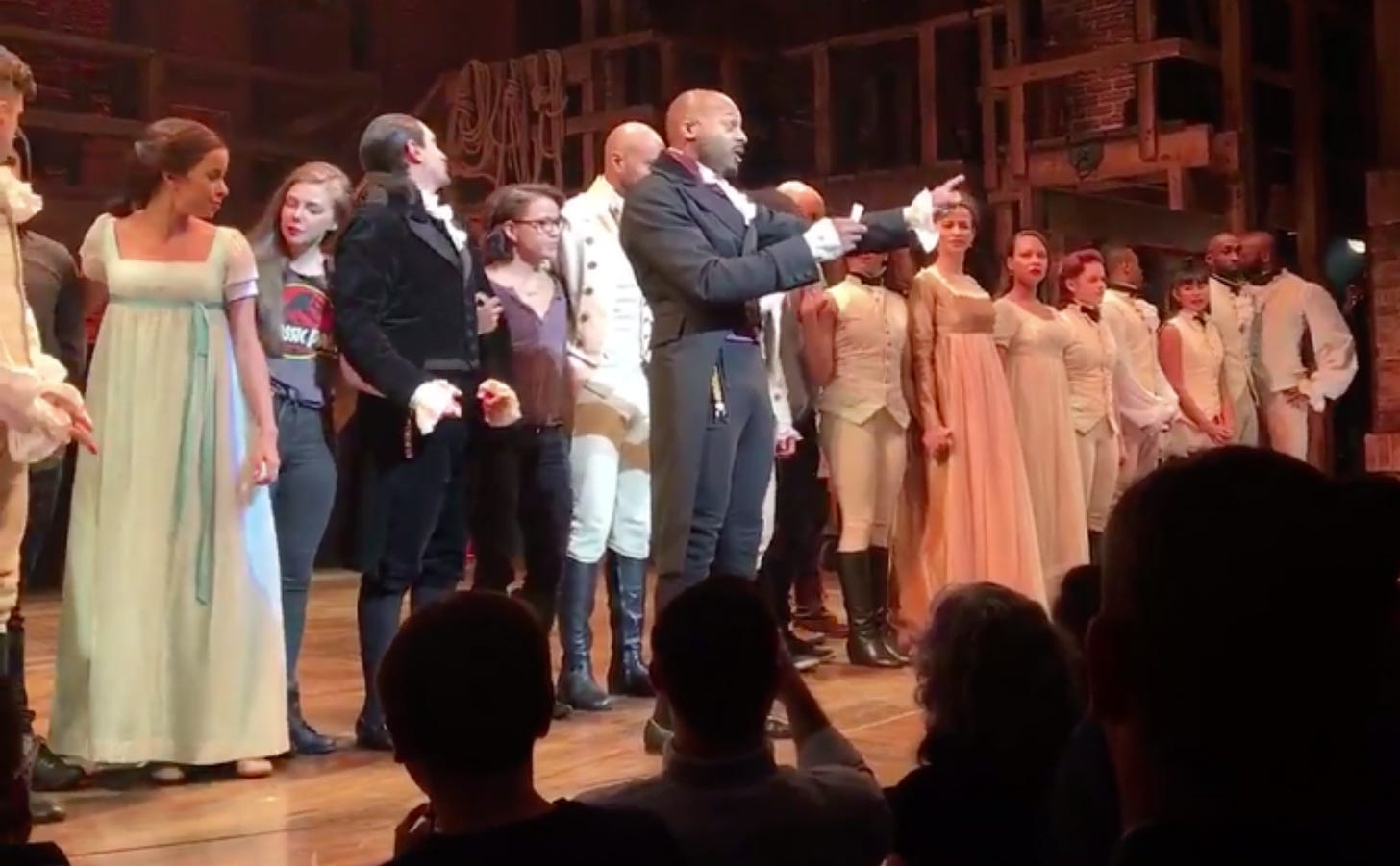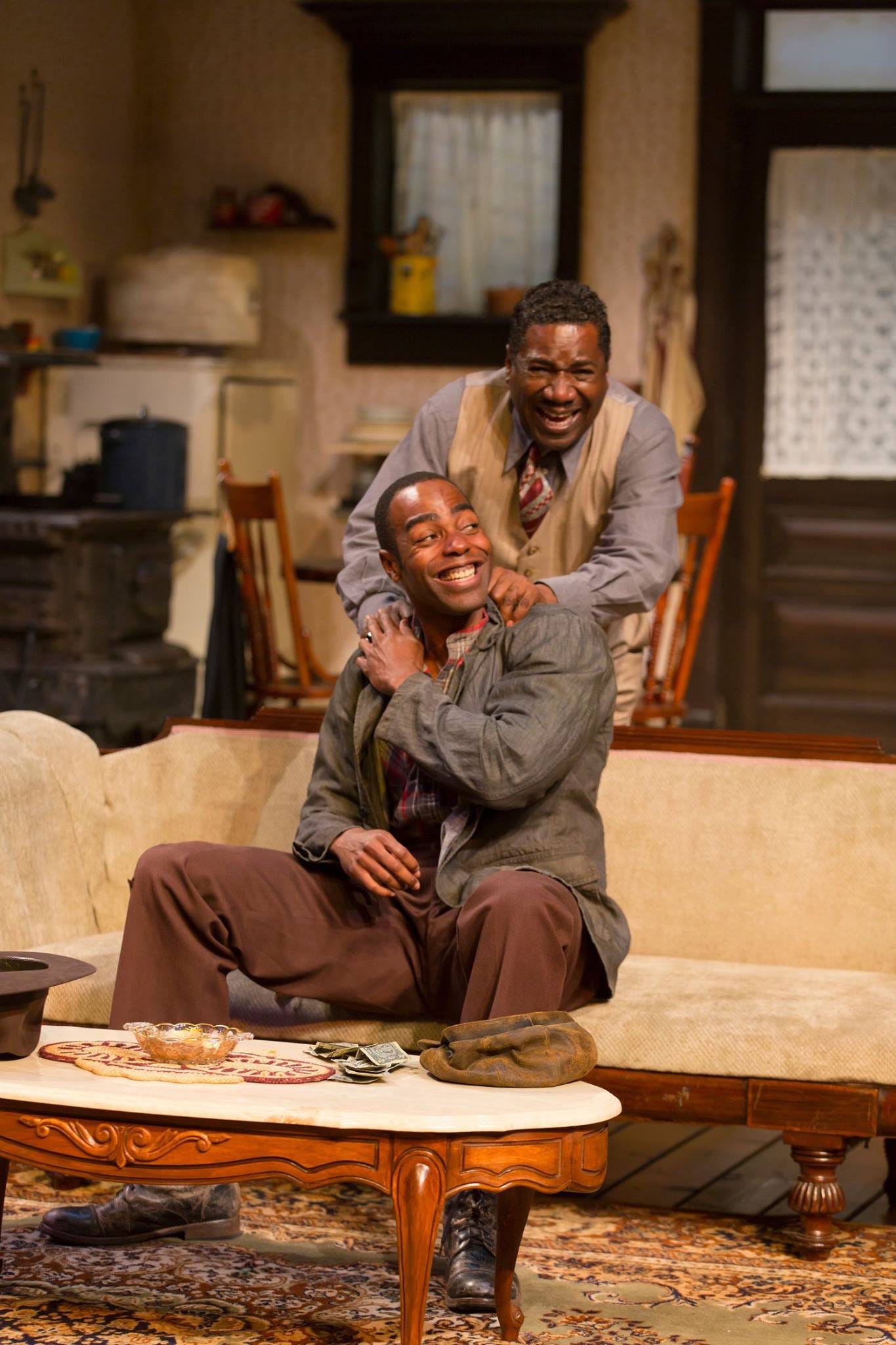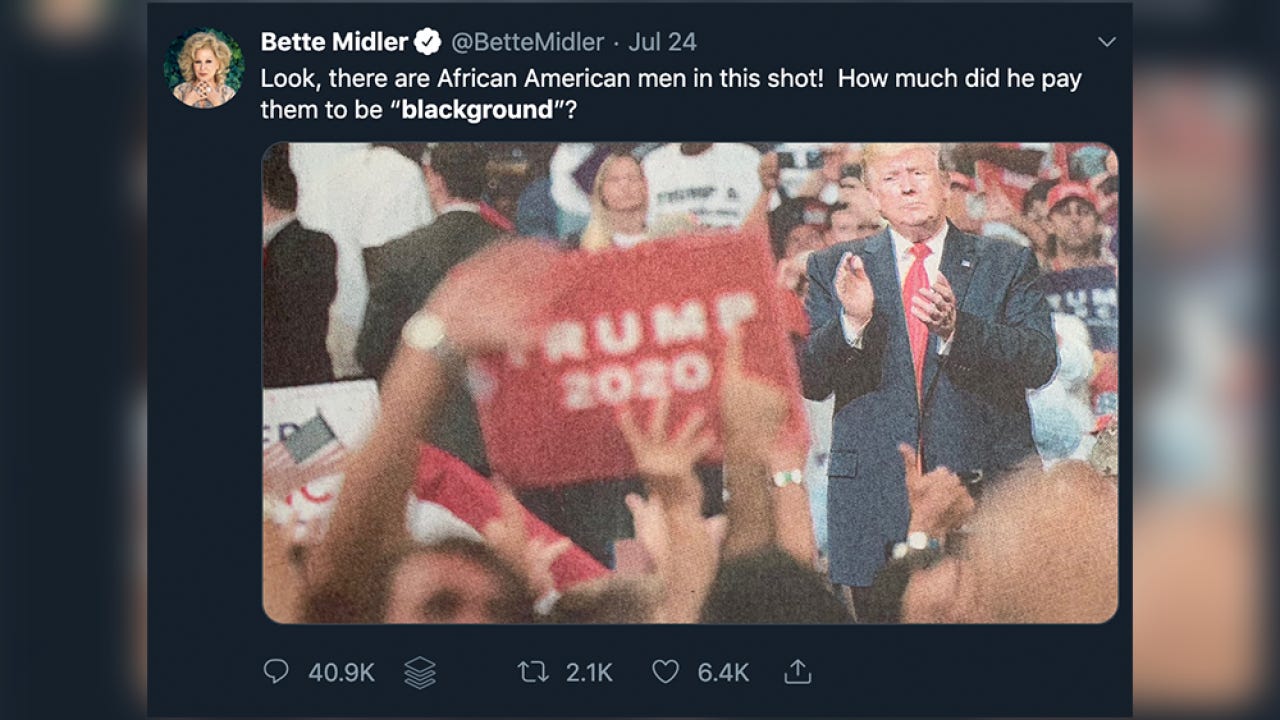The Entertainment Industry's Disgraceful COVID Response, Chapter 1: Trump Derangement.
Deeply-rooted partisan hatred, exacerbated by anti-Trumpism, fried the minds of entertainment professionals, which laid the groundwork for their subsequent Covidian extremism.
PREFACE: The entertainment industry sees itself as a collective of “Progressive” benevolence: champions of human rights and freedoms; protectors of the poor and the vulnerable; and warriors against discrimination. Yet, they proudly and zealously abandoned their principles in response to the Wuhan coronavirus pandemic, fervently embracing protocols and policies that constricted civil liberties, exacerbated wealth disparities, plunged millions into despair, and created a two-tiered society, which disproportionately affected Blacks and Latinos…ironic, given the industry’s wholesale devotion to “Antiracist” religiosity in the wake of George Floyd’s death in 2020.
In this first piece on this topic—yes, there will be sequels—I’ll highlight already-present partisan divisions that only worsened with the emergence of Donald Trump, as those divisions laid the foundation for the hysteria that followed.

REPUBLICANS ARE EVIL
Having spent nearly two decades in the performing arts, I was keenly aware that within the confines of the entertainment industry—and particularly within the American theatre—the word “Republican” means so much more than “an individual registered with the Republican Party”. In show business, the term is synonymous with a number of unpleasant appellations, from “heretic” to “witch”…and, of course, the ever-popular “Nazi”.
In sum, there is never serious consideration that people may, for a number of reasons, have different views on the size and role of government, or the allocation and expenditure of taxes—the sole allowable opinion is that those on “the other side” are evil and inhuman, and must never be seen as anything else.
Indeed, all Entertainment Professionals are well aware that the slightest stench of “Republicanism” must be avoided at all costs, if they wish to avoid character assassination and career annihilation by their Neo-McCarthyist peers. Hence, daily and ostentatious Republican-bashing is a time-honored, even sacred ritual, sort of like facing east and praying to Mecca five times a day.
As such, it came as no surprise to me that the ascendancy of perhaps the most polarizing Republican president of the modern era—Donald Trump—following on the heels of perhaps the most beloved Democratic president of the modern era—Barack Obama—caused a firestorm within the ardently Left-wing industry.
What was shocking, however, was observing otherwise functional adults succumb to severe emotional incontinence, raging at every sensationalist headline, immersing themselves in Cold War-esque Russophobia, and throwing tantrums over typo-laden, bombastic tweets…every single day.
For four long years.
Oddly enough, it was my Acting training, of all things, which helped me see through the madness.
CURIOSITY AND EMPATHY
In my conservatory training, I was taught that curiosity and empathy are essential to the craft of Acting. As such, I was frequently dismayed to see my peers refusing to employ either trait to expand their understanding of why Americans would make such a strange, unwieldy choice for president…but, given the potential social and professional consequences of doing so, most entertainment professionals prefer not to engage in what their colleagues might view as apostasy.
As I have for much of my life, I felt like a lone wolf, astride the boundary of two opposite yet co-existent realities: one in which everyday Americans were so fed up with the system that, as Michael Moore famously noted, “Trump's election is going to be the biggest fuck you ever recorded in human history”, and another in which we were helplessly plunging into an irredeemably racist, sexist, homophobic, fascist dictatorship.
I never shared the latter view, and could absolutely understand the former, for the simple reason that I happened to do what most of my peers obviously had not, but what Actors are trained to do:
I observed, and I listened.
One experience in particular came to color how I viewed everything I observed afterward; and what I saw—the profound disconnect between the perceptions of the entertainment industry, and the reality experienced by the public they are meant to serve—would have major ramifications in the coming years, both on my life and career, and on American society as a whole.
SUBVERTED EXPECTATIONS
“I put it on Facebook, ‘if you voted for Trump, you can unfriend me now!’” announced Roscoe, to the approval of the surrounding cast.
Knowing what I knew—about the dangers of appearing to dip a toe outside of the Blue Matrix by expressing a more nuanced perspective about why one might choose to vote for Cheeto Hitler—I chose to remain silent.
It was November, 2016, and I was working on a play called The Piano Lesson at Connecticut’s Hartford Stage Company. Set in 1936, August Wilson’s Pulitzer-winning work centers on the bitter feud between the brash and ambitious Boy Willie—who yearns to sell the titular piano in order to buy the land that he and his ancestors toiled over as slaves and sharecroppers—and his sister Berniece, who refuses to sell the instrument, as it is a cherished heirloom adorned with intricate carvings that chronicle the family’s history.
The play, which, like most of Wilson’s work, features an all-Black cast, is a vivid, deeply soulful, and at times supernatural dramatization of a tension that is ever-present in Black America, the delicate balance of recognizing and honoring historical injustice and pain, and the refusal to be held back or weighed down by it.

Given the racial tension that continues to pervade American society, a generalized disdain for Republicans, the bombastic, sensationalist, and, shall we say, crass rhetoric of Donald Trump, all within the context of a group of passionate Black artists working on one of the greatest plays of America’s foremost Black playwright…well, let’s just say that Roscoe’s surliness was to be expected, and none there would disagree with him—at least, not openly.
But I—never one to shy away from taking subversive pleasure in any given moment—was quite amused by Roscoe’s declaration; for what lent the scene a sense of dramatic irony is that in the week prior, I’d had my first encounter with a real-life, rather enthusiastic Trump supporter.
And he happened to be Black.
THE DISCONNECT
”Trump gonna make it so we can make some money, man!” The Barber said, gingerly sharpening my line-up. His friend, another Black man who looked roughly middle-aged (although, Black don’t crack, he may have been a hundred years old, who knows?) sat in a nearby chair, grinning from ear to ear, nodding in agreement.
Sadly, I don’t remember The Barber’s name, so from here on out I’ll simply refer to him as…well, The Barber.
Mr. Barber was a proud man of Jamaican heritage (Hartford, Connecticut boasts a significant Jamaican population), and his father’s poor education was ultimately rendered irrelevant, as apparently the man possessed a strong work ethic and a keen business acumen. The Barber’s Father made his living as a farmer, and given that his son was a serial entrepreneur, for whom barbering was only one hustle, it was obvious that these traits were passed down successfully.
I always felt relaxed in The Barber’s shop, located in a working class area of Hartford, as it served both as a welcome reprieve from an extremely stressful rehearsal process, and as an escape from the politically correct confines of the entertainment industry as whole. It was a “safe space” for the kind of edgy, salacious anecdotes and bawdy, masculine humor that would never be allowed among the principled, dignified people in Arts and Entertainment, who are above such low-class activities (but who will turn a blind eye to sexual predators and abusers for the sake of their careers).
I don’t remember how politics entered the conversation on this particular visit, but by this time I’d established a pleasant rapport with Mr. Barber, so much so that he was comfortable saying the unsayable: he was planning on casting his vote for History’s Most Hated President.
IT’S THE ECONOMY, STUPID
Like myself, Mr. Barber had clearly become disenchanted with the first Black President, “our” president; and although I am neither a businessman nor an economist, I was still very much aware of the frustration among small business owners regarding Obama’s stifling regulations, and as such could affirm Mr. Barber’s frustration.
Not once did the subject of race enter into the conversation; not once was concern about a rising tide of anti-Black hatred ever mentioned; not once did this proud Jamaican, or his colleague seated in the chair directly across from me, ever express the fear of resurgent White Supremacy that lived in the nightmares of my predominantly “Progressive” colleagues.
No—The Barber’s concerns were purely economic in nature.
Moreover, it became clear that these economic concerns transcended race, as between sets at the YMCA near the theatre, I eavesdropped on the White men there, who openly conversed about the upcoming election, and the banter was focused strictly on jobs and on taxes. Not once did these White men discuss their plot to oppress minorities, or evince paranoia about the Great Replacement. And, it should be added, they appeared to have all of their teeth, and none were whistling Dixie.
I then recognized what, sadly, many of my colleagues in the performing arts did not, which was that to most people, supporting the Orange Man had less to do with a desire for a White ethno-state, or with any great love for his personality, and more to do with practical, mundane matters such as prices, markets, jobs and taxes, and each of those major issues impact the sub-issues within it, from schooling to border security to law enforcement to military spending to social welfare, and beyond.
The old adage is true: “it’s the economy, stupid”.
THE FUTILITY OF UNITY
While certain hot-button issues, such as abortion access or how to best protect the environment, will likely always be grounds for debate and disagreement along partisan lines, those able to see beyond the “Left vs. Right” paradigm (I prefer to frame the debate as “Idealist vs. Realist”, respectively) understand that while personal biases will inevitably produce blind spots, Americans generally see the same problems, and merely have different ideas about how to best tackle those problems.
Understanding this, however, would leave room for compromise, and leaving room for compromise would involve recognizing that those demonized as “Nazis” are human beings, and recognizing ideological adversaries as human beings is career-endangering sacrilege to Entertainment Professionals.
Alas, while already-present partisan dehumanization and division would worsen during the Trump era, the appearance of the Wuhan coronavirus exacerbated things even further, and kicked off an ordeal that would come to reveal aspects of human nature that I found to be highly surprising, often disheartening, and—eventually—deeply, deeply disturbing.
COMING UP NEXT: THE DEATH OF THE CITY FORMERLY KNOWN AS NEW YORK.






Thanks for your courage and sharing your story. Ironic that actors are trained to have empathy and understand different characters, but can’t do that with dreaded republicans. Look forward to your piece on New York - here’s my escape from New York chronicle of a decade of demoralization: https://yuribezmenov.substack.com/p/escapefromnewyork
At last, Clifton, you're hitting your stride. I'm very proud of you. Sometime soon, you will get this: that we are in a spiritual battle between good and evil. Transhumanism is on the march and is bent on destroying the Arts.